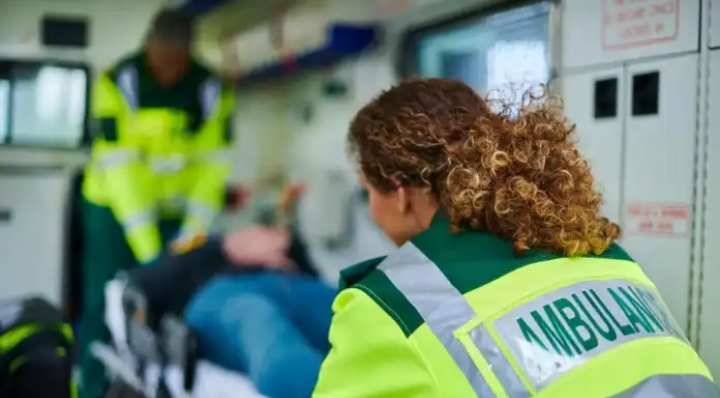News
Panic as over 5000 hospitalised in UK diagnosed with flu as NHS laments

By Kayode Sanni-Arewa
Latest data shows there were 5,000 patients with the virus being treated in hospital at the end of last week – almost 3.5 times higher than the same week in 2023, although not as high as in 2022.
The head of the Royal College of Emergency Medicine told the BBC that pressure on hospitals is “unacceptably awful” and flu is pushing them to breaking point.
It comes as health officials warn about the impact of the very cold weather expected this weekend on vulnerable patients, and the health system.
Prof Julian Redhead, NHS national clinical director for urgent and emergency care, said the figures show “the pressure from flu was nowhere near letting up before we headed into the new year, skyrocketing to over 5,000 cases a day in hospital as of the end of last week and rising at a very concerning rate”.
“With what looks like an extreme cold snap expected right across England ahead of the weekend, we know the low temperatures can be dangerous for those who are vulnerable or have respiratory conditions,” he added.
Prof Redhead says people at risk should try to keep warm and make sure they are stocked up on any regular medication.
It is not unusual to see an increase in flu during winter. The UK Health Security Agency says “this was anticipated” and that is why it has been urging those eligible to have a free flu vaccine, particularly health and social care workers.
Some 33% of pregnant women, 37% of people in an at-risk group and 73% of over-65s have had the jab, according to the latest vaccination figures.
‘Lack of beds’
Hospitals have put extra beds in place this year to help deal with the pressure on admissions created by flu and other winter viruses, including Covid and norovirus (the winter vomiting bug).
NHS chiefs say they have also added more support for people who frequently need emergency services, with more care being delivered outside hospitals.
Matthew Taylor, chief executive of the NHS Confederation, said the NHS had done “all it could” in advance to reduce risk to patients, but the service remained in a position of “national vulnerability” with “intense pressures” starting to impact local services.
Figures for last week show some 12,200 patients were left waiting in ambulances for more than an hour before they could be cared for in hospital.
Dr Adrian Boyle, head of the Royal College of Emergency Medicine, told BBC Radio 4’s Today programme that it was a very difficult time for both patients and staff.
“What we are seeing is ambulances are frequently stuck outside emergency departments, and our emergency departments are full.”
He said there was “an enormous amount of avoidable harm – excess deaths that shouldn’t be happening”.
Flu is the straw that is breaking the camel’s back – because we have this chronic lack of beds within our hospitals, and we don’t use those beds properly because we haven’t reformed social care,” he added.
His criticism comes on the day the health and social care secretary set out plans for reforming adult social care in England, although they are unlikely to be delivered before 2028 at the earliest.
A number of hospitals across different regions in England have restricted visits and asked patients and visitors to wear face masks to prevent further spread of flu.
In Scotland, there has also been a large rise in the number of people in hospital with flu. Earlier this week, First Minister John Swinney said the NHS was under “very significant pressures”.
A Welsh government spokesperson said there were continued “high levels of demand” on urgent and emergency care services this winter, and an increase in flu cases had added further pressure during the Christmas period.
What are flu symptoms?
Flu symptoms can progress very quickly and include:
a sudden high temperature
an aching body
feeling tired or exhausted
a dry cough
a sore throat
a headache
feeling, and being, sick
Children and adults are affected in a similar way.
Who is eligible for a free flu jab?
A free flu vaccine is available to those considered at higher risk of becoming seriously ill from flu during late autumn and early winter, including people:
aged 65 or over
with certain long-term health conditions
who are pregnant
who live in a care home
are the main carer for an elderly or disabled person, or receive a carer’s allowance
live with someone who has a weakened immune system
are a front-line health and social care worker
Children aged 2-3 and school-aged children are also offered a vaccine.
Anyone in eligible groups in England can book their vaccination through their GP surgery or local pharmacy, where available, or contact their employer if they are an NHS front-line worker.
People can also pay for vaccines privately at some pharmacies.
Why is flu so bad this year?
Flu creates problems every winter, being the season when viruses spread with ease, and can cause some to become very ill.
The severity of seasonal flu varies from year to year, depending on many factors, including which strains of the flu virus are most dominant and how many people are vaccinated against flu.
Why are some flu outbreaks so much worse than others?
A surge of flu appears to have hit earlier this winter than anticipated – in December, instead of January or February – with more people unwell and off work over the Christmas and New Year period, and some in need of hospital treatment.
People socialising with friends and family during the Christmas festivities will likely have added to the spread of the virus.
Health officials saw the flu wave coming, and have been urging people to take up the offer of a free flu vaccine for some time.
However, the number of people who have been vaccinated is lower than officials had hoped – just over a third of higher-risk adults have had the jab to date.
Several different strains of flu tend to circulate each winter, and the vaccine was created in advance to combat the current, predicted wave. According to health officials, the vaccine is doing its job.
Vaccines are particularly important in protecting against severe disease. Most people will recover from flu within a few weeks, but it can be serious, particularly if you have a long-term health condition or lower immunity.
Thousands of people die from flu-related illnesses each year.
News
Guinea Woos Nigerian Investors to Join $20bn Projects

News
Nigeria’s inflation jumps to 24.23% in March 2025

Nigeria’s headline inflation rate rose to 24.23% in March 2025, according to the official government data source, the Nigeria Bureau of Statistics (NBS).
The rise in the country’s inflation rate, from 23.18% back in February 2025 to 24.23% in March 2025, reflected a major increase in the rising commodity and energy costs in the last few weeks.
According to the March 2025 Consumer Price Index (CPI) Report which measures the inflation rate released by the government agency on Tuesday, the country’s food inflation rate was 21.79% year-on-year in March 2025.
The food inflation rate, however, showed a decrease compared to the food inflation rate of 23.51% recorded in February 2025.
Economists had predicted that the country’s inflation rate which decreased minimally in February would rise when the Dangote Refinery and the state-run NNPCL got entangled in a petrol price war that culminated in the temporary termination of a naira-for crude agreement between the two oil companies and the subsequent increase in the pump price of petrol.
Some observers had also said the minimal reduction in the prices of food commodities experienced earlier in February was not sustainable, attributing the temporary decline in the prices of food to the importation intervention of the Federal Government.
Food and commodity inflation have skyrocketed as Nigerians battle what can pass for the worst cost of living crisis since the country’s independence over six decades ago, a development that economic wizards have attributed to President Bola Tinubu’s twin policies of petrol subsidy removal and unification of the forex rates.
News
Plateau 51: Mutfwang mourns, says “we failed you”, begs affected community

Governor Caleb Mutfwang of Plateau State has apologised to the people of Bassa Local Government Area (LGA) for the failure of government and security agencies to protect lives and properties.
Fifty-one persons were gunned down early Monday in the Zikke community of the LGA, with houses razed and many displaced about two weeks after a similar attack led to the killing of scores of persons in Bokkos Local Government Area.
Less than two days after the most recent assault, Governor Mutfwang apologised for the government’s inability to protect the people.
Fifty-one persons were gunned down early Monday in the Zikke community of the LGA, with houses razed and many displaced about two weeks after a similar attack led to the killing of scores of persons in Bokkos Local Government Area.
Less than two days after the most recent assault, Governor Mutfwang apologised for the government’s inability to protect the people.
The governor said this on Tuesday at the palace of the Paramount Ruler in Miango.
“I will tell you the truth: I have been crying since yesterday because I had trusted God that all the arrangements were put in place, that this will not happen again. We have made investments in security,” he said.
But like all human arrangements, sometimes they fail. I want to admit that on Sunday night into Monday morning, we failed you. Please, forgive me.”
He urged the people not to relent in their efforts to secure their communities and ensure that they complement security agencies’ efforts by providing vital information for intelligence gathering and expose the antics of the criminals.
Governor Mutfwang, in the company of security chiefs and members of the state executive council, was in Zikke community to commiserate with the people on the death of over fifty persons killed in Monday’s attacks.
The Paramount Ruler of Irigwe land, Ronku Aka, who is the Brangwe of Irigwe, urged the government to come to the aid of the communities with the provision of social amenities in the area.
The governor and the entourage also went to see some of the families who lost their loved ones in the attack. The victims have been buried just as members of the community demanded action to stem the rising wave of insecurity in the state.
Plateau State has been a hotbed of attacks, but the renewed spate of attacks adds a fresh layer of twist to the decades-long crisis rocking the North-Central state.
After the most recent assaults, President Bola Tinubu ordered security agencies to fish out the masterminds, describing the attacks as condemnable.
While experts have linked the lingering Plateau crisis to farmers-herders tussle for resources, Governor Muftwang said it was sponsored and genocidal.
According to him, over 64 communities in the state have been taken over by gunmen.
-

 News11 hours ago
News11 hours agoSHOCKING! One month after giving birth, woman discovers another baby in her womb
-

 News12 hours ago
News12 hours agoTears, anguish as Plateau Community buries 51 killed by bandits
-

 News9 hours ago
News9 hours agoCBEX: 60 fraudulent Ponzi scheme operators to avoid in Nigeria
-

 News17 hours ago
News17 hours agoPeter Obi speaks as Benue govt. blocks humanitarian visit
-

 News11 hours ago
News11 hours agoAngry investors raid CBEX office, loot assets in Ibadan after digital Platform crash
-

 News18 hours ago
News18 hours agoFUOYE VC suspended over sexual harassment allegations
-

 Politics11 hours ago
Politics11 hours agoIgbo Youths Set To Mobilize 5 Million Man-March In Support Of Tinubu, Kalu
-

 News11 hours ago
News11 hours ago‘Not something I’d wish on anyone’ — Melinda Gates opens up on divorce


















